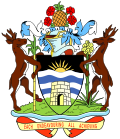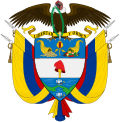Trade
In 1994, CARICOM and Colombia signed a free trade agreement aimed at promoting trade and investment, cooperation and the creation of joint ventures.
In 2013, Colombia and Antigua and Barbuda traded US$828,000. This is not significant for Colombia's foreign economy or its GDP. Of those US$828,000, Colombia exported US$611,000, while Antigua and Barbuda exported US$218,000. This left Colombia with a positive trade balance.
In 2022, Colombia exported $3.06M to Antigua and Barbuda. The products exported from Colombia to Antigua and Barbuda included Cement ($1.47M), Raw Sugar ($202k), and Petroleum Coke ($173k). Antigua and Barbuda exported $6.45M to Colombia. The products exported from Antigua and Barbuda to Colombia included Engine Parts ($1.13M), Motor vehicles; parts and accessories (8701 to 8705) ($980k), and Transmissions ($534k). [15]
Trade between Antigua and Barbuda and Colombia| Country | Exports ($USD) | Percentage (exports) | Percentage (imports) | Percentage (total) | Products |
|---|
 Antigua and Barbuda Antigua and Barbuda | $218,476 | 0.09% | 0.56% | 0.53% | inks and paints, pharmaceutical products, tools, plastic products, electrical appliances, vehicle parts. |
 Colombia Colombia | $611,107 | 0.00104% | 0.00037% | 0.0007% | sugars and confectionery, plastic articles, pastries, wood articles, prepared foods, cocoa. |
Source: Trade Map [16]
This page is based on this
Wikipedia article Text is available under the
CC BY-SA 4.0 license; additional terms may apply.
Images, videos and audio are available under their respective licenses.


